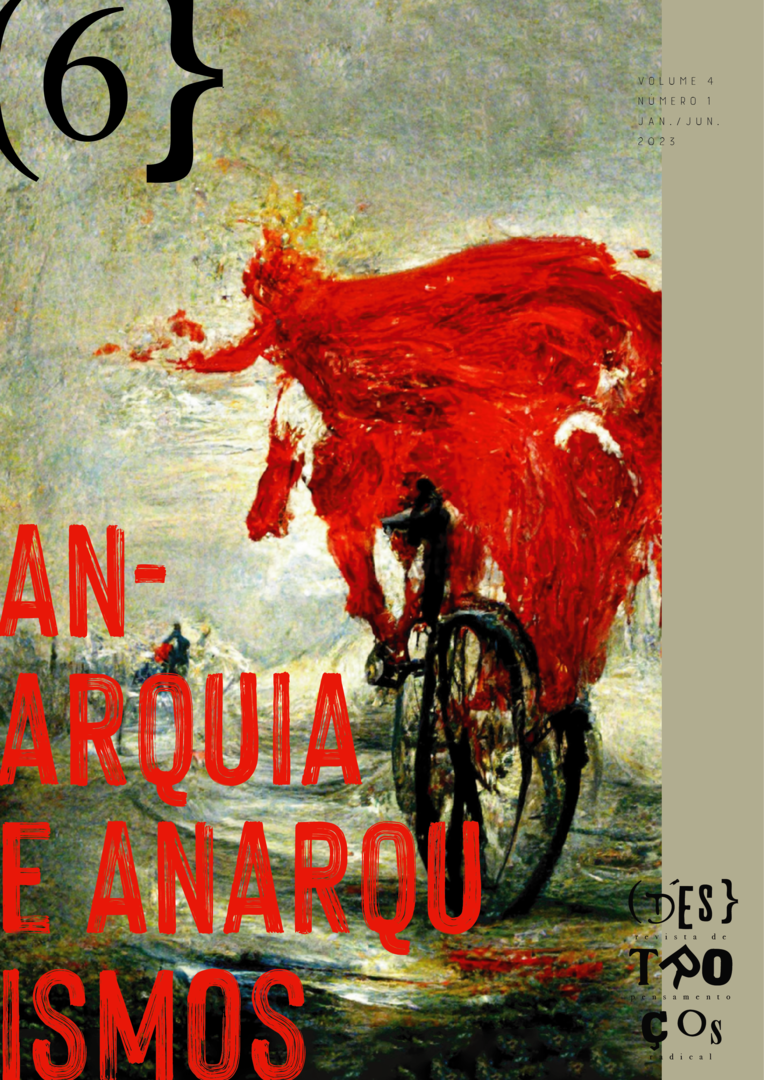People, democracy and the an-archy of the political: a critique of constitutionalism based on Jacques Rancière
Published 2023-07-20
Keywords
- constitutionalism,
- democracy,
- Jacques Rancière,
- Constituent power,
- People
How to Cite
Copyright (c) 2023 Reinaldo Silva Cintra

This work is licensed under a Creative Commons Attribution 4.0 International License.
Abstract
The present paper aims to put in critical dialogue the tradition of constitutionalist thought and the notions of an-archic politics and democracy developed by Jacques Rancière in his works, through a common theme to both fields: the concept of "people". The aim is, on one hand, to discuss the essentialist and vague nature of this concept in legal theory, as the foundation of the constitutional order and the double of the state it constitutes, in theory. On the other hand, we present Rancière's elaborations around the existence of a "people" as a singular subjectivation that challenges and confounds the identification of the "people" as the totality of a social order composed of supposedly natural divisions and hierarchies. We conclude that Rancière's work points to the limits of constitutionalism as an alleged regime of uniformity and consensus, without, however, advocating for its total disregard. More than an exchange of paradigms, Rancière's democracy bets on a repoliticization of constituent moments as scenes of dissensus around the meaning and scope of the so-called "fundamental rights" and their subjects.
Downloads
References
- AGAMBEN, Giorgio. Meios sem fim: notas sobre a política. Belo Horizonte: Autêntica, 2015.
- BALIBAR, Étienne; WALLERSTEIN, Immanuel. Raça, nação, classe: as identidades ambíguas. São Paulo: Boitempo, 2021.
- BARROSO, Luís Roberto. Curso de direito constitucional contemporâneo: os conceitos fundamentais e a construção do novo modelo. 7. ed. São Paulo: Saraiva Educação, 2018.
- BERCOVICI, Gilberto. Soberania e constituição: para uma crítica do constitucionalismo. 2. ed. São Paulo: Quartier Latin, 2013.
- BONAVIDES, Paulo. Ciência política. 18. ed. São Paulo: Malheiros, 2011.
- BONAVIDES, Paulo. Curso de direito constitucional. 15. ed. São Paulo: Malheiros, 2004.
- BUTLER, Judith. Corpos em aliança e a política das ruas: notas para uma teoria performativa de assembleia. Rio de Janeiro: Civilização Brasileira, 2018. Ebook.
- DALLARI, Dalmo de Abreu. Elementos de Teoria Geral do Estado. 30. ed. São Paulo: Saraiva, 2011.
- DERRIDA, Jacques. A escritura e a diferença. 3. ed. São Paulo: Perspectiva, 2005.
- FERREIRA FILHO, Manoel Gonçalves. O poder constituinte. 6ª ed. São Paulo: Saraiva, 2014.
- FRANK, Jason. Constituent moments: enacting the people in postrevolutionary America. Londres: Duke University Press, 2010. Ebook. DOI: https://doi.org/10.1515/9780822391685
- GETACHEW, Adom. Universalism after the post-colonial turn: interpreting the haitian revolution. Political Theory, Nova York, v. 44, n. 6, p. 821-845, ago. 2016. Disponível em: https://www.jstor.org/stable/26419440. Acesso em: 14 jul. 2023. DOI: https://doi.org/10.1177/0090591716661018
- JELLINEK, Georg. Teoría General del Estado. Cidade do México: Fondo de Cultura Económica, 2000.
- MARCHART, Oliver. Democracy and Minimal Politics: the political difference and its consequences. The South Atlantic Quarterly, Durham, v. 110, n. 4, p. 965-973, out. 2011. Disponível em: https://read.dukeupress.edu/south-atlantic-quarterly/article-abstract/110/4/965/3557/Democracy-and-Minimal-Politics-The-Political. Acesso em: 14 jul. 2023. DOI: https://doi.org/10.1215/00382876-1382357
- NEGRI, Antonio. O poder constituinte: ensaio sobre as alternativas da modernidade. 2. ed. Rio de Janeiro: Lamparina, 2015.
- OLSON, Kevin. Imagined sovereignties: the power of the people and other myths of the modern age. Cambridge: Cambridge University Press, 2016. DOI: https://doi.org/10.1017/CBO9781316286265
- PINTO NETO, Moysés. A matriz oculta do Direito moderno: crítica do constitucionalismo contemporâneo. Cadernos de Ética e Filosofia Política, São Paulo v. 17, p. 131-152, fev. 2010. Disponível em: https://www.revistas.usp.br/cefp/article/view/55710. Acesso em: 14 jul. 2023.
- RANCIÈRE, Jacques. “The thinking of dissensus: politics and aesthetics”. In: BOWMAN, Paul; STAMP, Richard (org.) Reading Rancière: critical dissensus. Nova York: Continuum, 2011. p. 1-17. DOI: https://doi.org/10.5040/9781472547378.ch-001
- RANCIÈRE, Jacques. A partilha do sensível: estética e política. 2. ed. São Paulo: Editora 34, 2009.
- RANCIÈRE, Jacques. Nas margens do político. Lisboa: KKYM, 2014.
- RANCIÈRE, Jacques. O desentendimento: política e filosofia. São Paulo: Editora 34, 1996.
- RANCIÈRE, Jacques. O ódio à democracia. São Paulo: Boitempo, 2014.
- ROUSSEAU, Jean-Jacques. Do contrato social ou princípios do direito político. São Paulo: Penguin: Companhia das Letras, 2011.
- RUBIO, David Sanchez. Direitos humanos instituintes. Rio de Janeiro: Lumen Juris, 2022.
- SCHMITT, Carl. Teoría de la constitución. Madrid: Alianza Editorial, 1982.
- SILVA, José Afonso da. Poder constituinte e poder popular: estudos sobre a constituição. São Paulo: Malheiros, 2002.
- SILVA, Virgílio Afonso da. Direito constitucional brasileiro. São Paulo: EdUSP, 2021.
- SOUZA NETO, Cláudio Pereira de; SARMENTO, Daniel. Direito constitucional: teoria, história e métodos de trabalho. 2ª ed. Belo Horizonte: Fórum, 2014.

